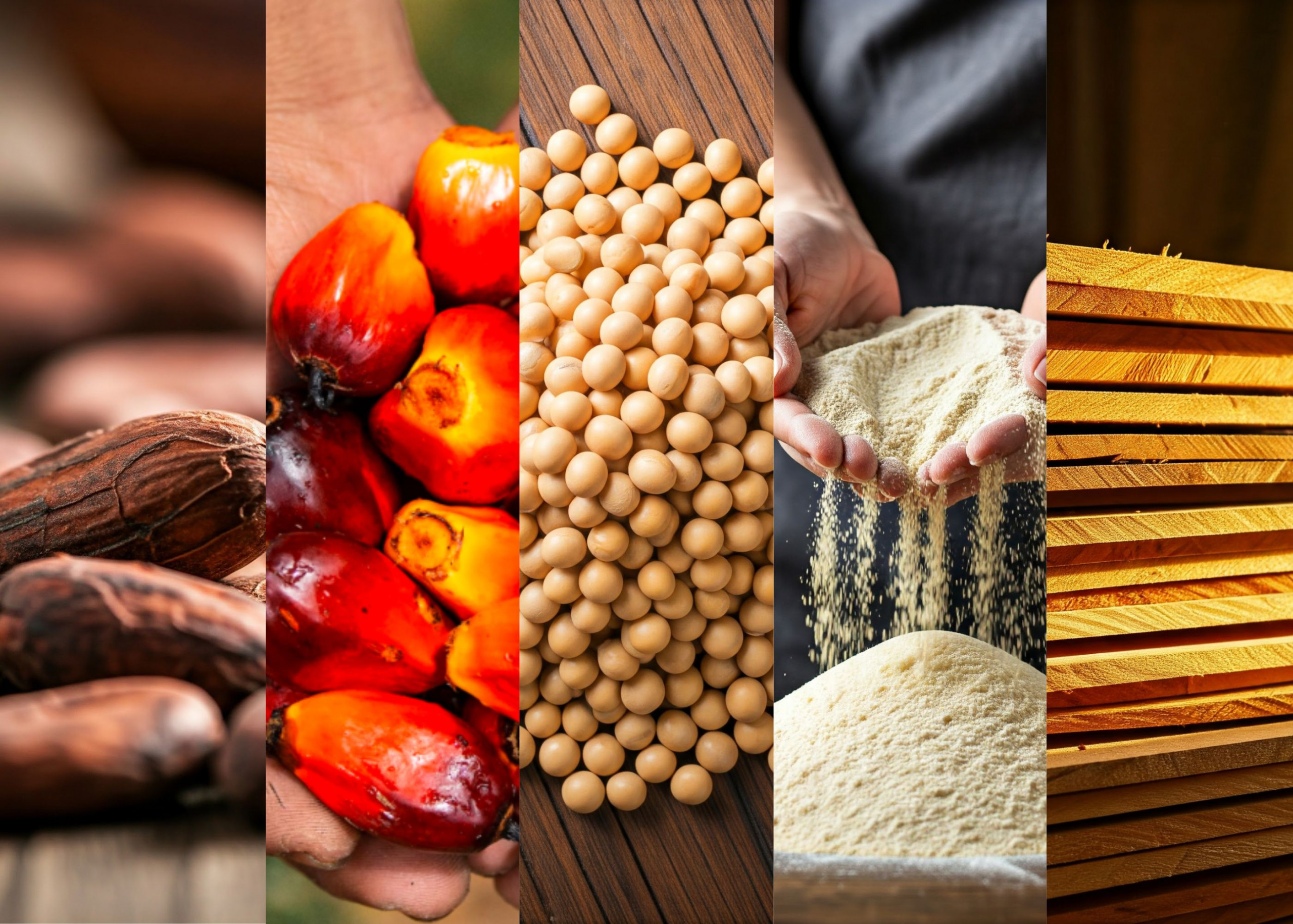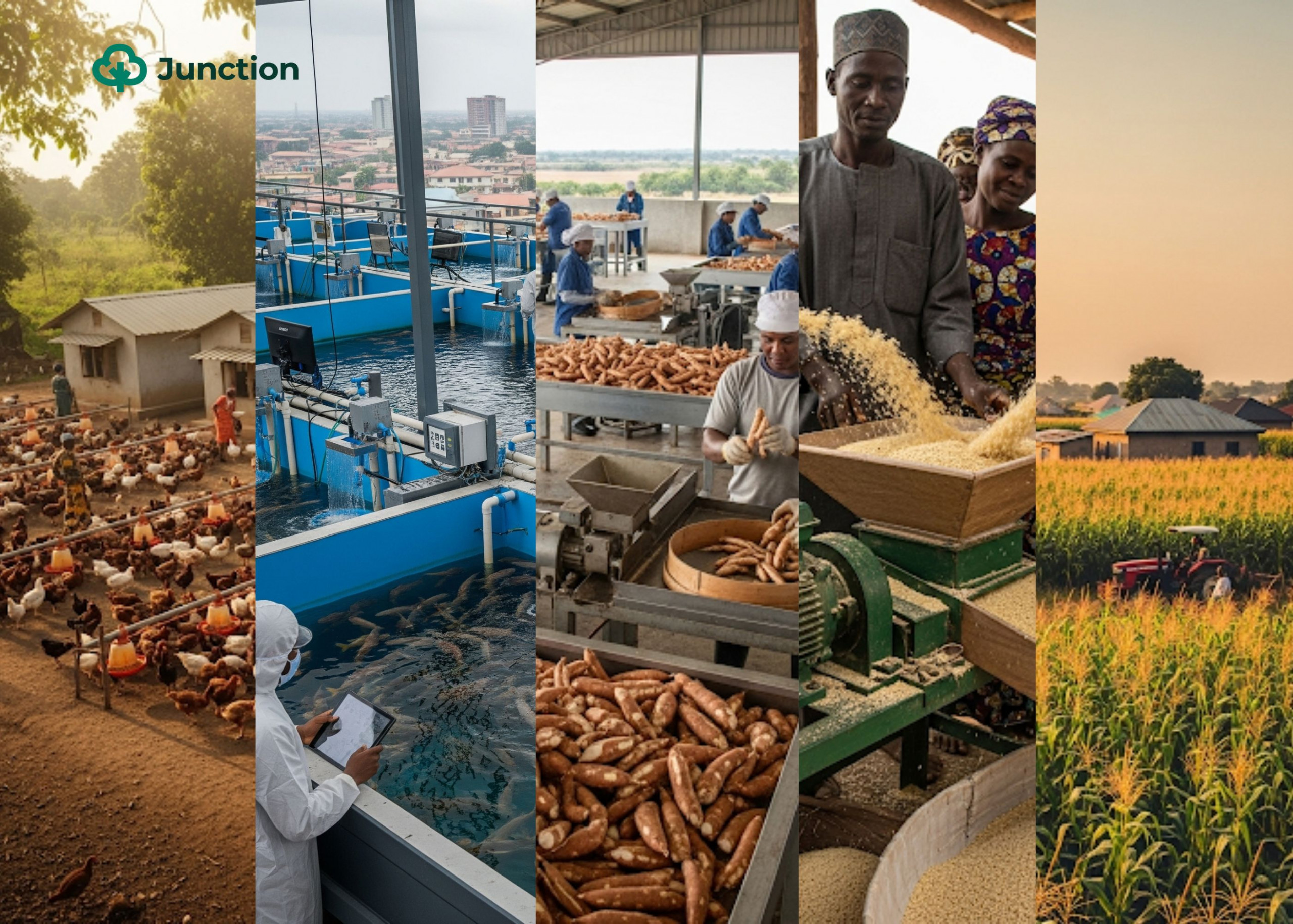Agriculture is the backbone of many industries, supplying raw materials that drive global economies. Some agricultural products are not only essential but also extremely valuable due to their price per ton or kilogram.
Here’s a look at the top five most common agricultural raw materials in Nigeria and used in different industries, ranked by their value.
1. Cocoa beans

- $10,800+ per tonne
- Key Industries: [Food, cosmetics, pharmaceuticals, etc.]
- Overview:
The cocoa bean is the dried and fully fermented seed of the cacao tree. Although the tree was first domesticated several thousands of years ago in South America, West African countries now produce about 81% of it. The crop is primarily known for its role in the chocolate and confectionery industries. It can be processed into cocoa butter, cocoa powder, and chocolate liquor, which are key ingredients in chocolates, desserts, and beverages. Beyond food production, cocoa butter is a key ingredient in the cosmetics and skincare industries due to its moisturising properties and rich content of natural fats. It is commonly used in lotions, creams, lip balms, and soaps, making it a cornerstone ingredient in beauty products worldwide. Additionally, cocoa-derived compounds are utilised for their antioxidant and anti-inflammatory properties. Cocoa polyphenols are increasingly researched for their potential to improve heart health and combat chronic diseases. - Fun Fact:
The Mayans used cocoa to create a ritual drink during engagement and marriage ceremonies and it was customary for the bride and groom to exchange five cocoa beans instead of a ring —as a blessing for a good, fruitful and abundant life.
2. Palm oil

- $4,400+ per tonne
- Key Industries: [Food, cosmetics, energy, pharmaceuticals, textile, plastic, etc.]
- Overview:
Palm oil is an edible vegetable oil derived from the reddish pulp (middle layer) of the fruit of oil palms. Indonesia and Malaysia contribute more than 85% of the global production of this product. It is also very common in Nigeria, with the country boasting large palm plantations. Palm oil is used in the food industry as cooking oils, margarine, baked goods, snacks, and processed foods. Its stability at high temperatures and long shelf life make it a preferred choice for frying and as a preservative. Other derivatives such as palm kernel oil and palm olein, are used in specialty fats, non-dairy creamers, and as a substitute for trans fats in many recipes. It is also a common base for soaps, shampoos, detergents, and candles due to its natural emollient and foaming properties. The biodiesel industry relies heavily on palm oil as a renewable energy source, blending it with traditional fuels to reduce carbon emissions. Palm oil is used in the production of lubricants, adhesives, and industrial chemicals, making it a highly versatile raw material. - Fun Fact:
If stored correctly, organic palm oil can last for at least 12 months without becoming rancid.
3. Soybeans

- $1,052+ per tonne
- Key Industries: [Food, paper, printing, chemicals, etc.]
- Overview:
Soybeans (also called soya beans) are edible beans commonly grown in Nigeria. Brazil, the United States, and Argentina are the top producers in the world, cornering at least 80% of total produce. This crop can be processed into soy protein, soybean oil, and soy lecithin. Soybean oil, extracted from crushed soybeans, is one of the most consumed vegetable oils globally and is used in cooking, frying, and as an ingredient in processed foods. Soy lecithin, a byproduct of soybean oil processing, serves as an emulsifier in chocolates, baked goods, and salad dressings, enhancing texture and shelf stability. In non-food industries soy-based adhesives are commonly used in paper and cardboard production, offering an eco-friendly alternative to petroleum-based glues. In the printing industry, soybean oil is used to produce soy-based inks, which are non-toxic, biodegradable, and provide vibrant colours. Meanwhile, in the chemical sector, soybeans are processed into bio-based products like biodiesel, lubricants, and plastics, which reduce dependency on fossil fuels. - Fun Fact:
Henry Ford experimented with soy-based plastics in the production of his cars. In 1940 he swung an axe at a car trunk to demonstrate the durability of soy plastics.
4. Wheat

- $548+ per tonne
- Key Industries: [Food, animal feed, energy]
- Overview:
Wheat is a group of grasses are cultivated for their cereal grains and they are staple foods around the world. Well-known wheat species and hybrids include the most widely grown common wheat (T. aestivum), spelt, durum, emmer, einkorn, and Khorasan or Kamut. The crop is grown on a larger area of land than any other food crop and it is more globally traded than all other crops combined. Wheat is primarily used in the food industry to produce staple products such as bread, pasta, noodles, biscuits, and breakfast cereals. Wheat flour, derived from milling wheat grains, serves as the foundation for countless baked goods, while durum wheat is specifically used to produce high-quality pasta. Beyond human consumption, wheat byproducts, such as bran and germ, are incorporated into fortified foods, health supplements, and snack bars due to their high nutritional value. Other byproducts from milling, such as wheat bran, middlings, and screenings, are commonly used as feed for livestock, offering a cost-effective and nutrient-rich option for farmers. It also plays a growing role in the renewable energy sector, where it is processed into bioethanol—a sustainable alternative to fossil fuels. Bioethanol is derived from wheat starch and blended with traditional fuels to reduce greenhouse gas emissions and promote energy sustainability. - Fun Fact:
Pharaohs in ancient Egypt were buried with wheat and archaeologist found seeds in their tombs.
5. Lumber

- $538+ per tonne
- Key Industries: [Construction, furniture making, paper production, sawmilling, etc.]
- Overview:
Lumber (or timber) is wood that has been processed into uniform and useful sizes. It is a key raw material in the construction and manufacturing industries due to its strength, versatility, and renewability. Lumber is a primary material for building homes, furniture, flooring, and interior finishes. Structural lumber, such as beams and planks, is essential for framing walls, roofs, and floors, while engineered wood products like plywood and laminated veneer lumber (LVL) are commonly used for added durability and precision. Its natural insulation properties and aesthetic appeal also make it a popular choice for doors, windows, and decorative finishes in both residential and commercial buildings.Beyond construction, lumber has extensive applications in packaging, paper, and furniture production. In the packaging industry, it is used to create pallets, crates, and boxes for transporting goods. In the paper industry, wood fibres are processed into pulp, which is then used to produce paper, cardboard, and other paper products. Additionally, byproducts from lumber processing, such as sawdust and wood chips, are used in bioenergy production, particleboard manufacturing, and as raw materials in various chemical processes. - Fun Fact:
Wood is a natural insulator that’s five times better than concrete.
Conclusion
Agricultural raw materials play a crucial role in driving industries across the globe, serving as the backbone of various economic activities. Cocoa, palm oil, soybeans, wheat, and lumber are among the most valuable agricultural products, not only for their versatility but also for their economic importance. These commodities provide essential inputs for key industries, ranging from food production and cosmetics to renewable energy and construction. Their multifaceted uses underscore the indispensable link between agriculture and industrial development, highlighting the need for sustainable practices to ensure their continued availability.
In Nigeria, these raw materials are not only vital for domestic industries but also hold significant export potential, contributing to the country’s economy. By leveraging the value of these agricultural products, Nigeria can strengthen its position in the global market, attract investments, and drive innovation in various sectors. As the demand for these commodities continues to rise, focusing on sustainable production, efficient processing, and diversification will be key to unlocking their full potential while preserving natural resources for future generations.



